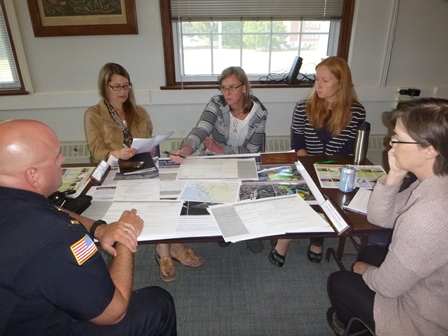The Essex Historical Society and Shipbuilding Museum (EHSSM), is a unique institution nestled along the…

Coastal Resiliency Planning Project Works on Solutions
Municipal Task Forces for the Great Marsh Resiliency Planning Project met In Salisbury and Ipswich last week. Facilitated by staff from the Ipswich River Watershed and the National Wildlife Federation, the community working groups finalized the past year’s work: assessing the risk and vulnerability of coastal communities to sea level rise, storm surge, erosion, and flooding. Discussions among these six communities (Salisbury, Newburyport, Newbury, Rowley, Ipswich, and Essex) have now transitioned to developing plans to reduce those risks.
Over the next six months, the planning project will be talking more about “adaptation strategies”, activities and projects communities can take to better prepare for the impacts of climate change. As seen with the current drought, climate change is bringing more extreme weather patterns to our region. Our communities are dealing with an array of challenges: flooding roads that impact resident travel and emergency transportation routes, business districts impacted by storms, beach and dune erosion affecting important recreational areas, to name a few of the most critical. The Resiliency Planning Project has brought together open space coordinators, planning board members, emergency management directors, conservation agents, and public works staff, among others, to discuss the best ways to manage flood waters and to restore beach and marsh systems.
The broader community and all area residents are invited to join the task force members for further discussion of these topics at the Great Marsh Coalition’s 2016 Sea Level Rise Symposium: Implications for Quality of Life in Our Communities. As we work together towards a final Great Marsh Resiliency Adaptation Plan, we will build off of existing work in the towns, assisting the communities with future decision-making and planning. Our goal is that critical human systems (such as communities, economies, and culture) and natural systems (including wetlands, coastal ecosystems, and fisheries) can continue to function effectively in the face of climate change.
For more information on the Planning Project contact Kristen Grubbs at 978-412-8200. The 2016 Great Marsh Symposium will be held on November 17th, at Woodman’s in Essex. For more information, visit www.greatmarsh.org.




Comments (0)